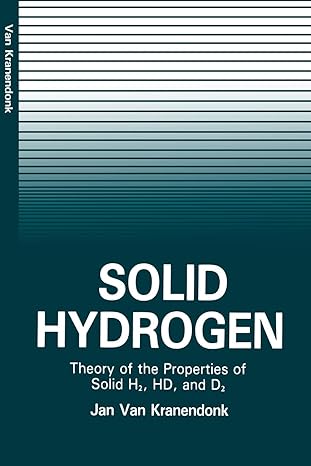Go back


Solid Hydrogen Theory Of The Properties Of Solid H2 Hd And D2(1st Edition)
Authors:
Jan Van Kranendonk

Cover Type:Hardcover
Condition:Used
In Stock
Include with your book
Free shipping: April 06, 2024Popular items with books
Access to 3 Million+ solutions
Free ✝
Ask 10 Questions from expert
200,000+ Expert answers
✝ 7 days-trial
Total Price:
$0
List Price: $42.93
Savings: $42.93(100%)
Book details
ISBN: 1468443038, 978-1468443035
Book publisher: Springer
Get your hands on the best-selling book Solid Hydrogen Theory Of The Properties Of Solid H2 Hd And D2 1st Edition for free. Feed your curiosity and let your imagination soar with the best stories coming out to you without hefty price tags. Browse SolutionInn to discover a treasure trove of fiction and non-fiction books where every page leads the reader to an undiscovered world. Start your literary adventure right away and also enjoy free shipping of these complimentary books to your door.
Solid Hydrogen Theory Of The Properties Of Solid H2 Hd And D2 1st Edition Summary: The solid molecular hydrogens are the simplest and most fundamental molecular solids. Except at ultrahigh pressures on the order of a few mega bars, where a transition to a metallic, atomic phase is expected, these solids are true molecular crystals in which the molecules retain their identity with properties not too different from those of the free molecules. At energies below the electronic excitation energy, the thermal and spectroscopic pro perties of these solids are determined by the translational, rotational, and intramolecular vibrational motions of the interacting molecules. The theo retical analysis of the solid-state properties in terms of the free molecules and the intermolecular interactions forms the main topic of this book. The available detailed knowledge of the properties of the free molecules makes it feasible to carry out this program to a large extent on the basis of first principles, and this is one of the attractive features of these systems. The solid hydrogens are dominated by quantum effects, the most out standing property being that the rotation of the molecules is free down to the lowest temperatures, in the sense that the rotational quantum number J characterizing the rotational motion of the free molecules remains a good quantum number in all of the solid-state phases except at ultrahigh pressures.
Customers also bought these books
Frequently Bought Together
Top Reviews for Books
Kenneth diaz
( 5 )
"Delivery was considerably fast, and the book I received was in a good condition."










